“A Seat at the Table” Celebrates Self-Love with Perfectly Light Production

The Knowles’ sisters are all about surprising their fans. This past Friday, Sept. 30, Beyoncé’s younger sister Solange Knowles released her first full-length album since 2008 and her first musical effort since 2012. The album was a double release, complete with a digital album booklet that included all of the album’s lyrics as well as artistic photos featuring Knowles and other models.
If I had to think of one phrase to describe Solange’s new album, I would say: Tangible Black Girl Magic. Everything about this album is art. From the way the lyrics are presented in the digital booklet, to the photos that accompany the song titles themselves. So what makes this album so magical? I think it’s the accessibility. Before, Solange’s work was so overproduced it was hard to listen to for a long time. Now, however, we as listeners can come to a central meeting point with Solange and her work, and sing, cry and dance along with her.
Solange is also using her album simultaneously as a creative outlet, and an example of radical self love. “You got the right to be mad,” Knowles says in a track titled “Mad” that features Lil’ Wayne. Explicitly telling listeners that it’s okay to be upset isn’t something you see very often in mainstream music. Knowles goes even further than this though, and uses her album as a piece of activism. At a performance in 2015 for HBO, Knowles revealed that her album would feature a song entitled “Rise.” This song is the album’s opener, and takes inspiration from the protests following the unjust killing of black people by police, particularly in Ferguson and Baltimore.
My favorite thing about Solange’s album is how delicate it sounds. Compared to “True,” her 2012 EP and “Sol-Angel and the Hadley St. Dreams,” her 2008 full length album, the production is much lighter. Don’t get me wrong, “A Seat at the Table” is still synth heavy and far from lo-fi, but the difference between her newest effort and past efforts is quite apparent. Knowles explicitly stated on her twitter account that “A Seat at the Table” is meant to “provoke healing & [a] journey of self empowerment.” I suggest you listen to this album when times are at their hardest. Listening to it will be the pick-me-up you need. It may even remind you to love yourself as you are.
Best Track Titles (because, yes, they are that good):
“Don’t Touch My Hair”
“Interlude: I Got So Much Magic, You Can Have It”
“Interlude: Tina Taught Me”
“Borderline: An Ode to Self Care”
Best Tracks:
“Interlude: Tina Taught Me”: Perhaps Frank Ocean started a trend when he included clips of his mother giving him advice about being true to himself on his most recent album, “Blonde.” On this interim track, Tina Knowles’ voice proudly states: “There is so much beauty in being black.” She then goes on to say there’s nothing wrong in being proud to be black. Maybe we hear it a lot on this campus, through our lifting up of one another. But, I would argue that you can never hear it too many times. And hearing it from Beyoncé and Solange’s legendary mother? Well that makes it even better.
“Weary”: On this track, Solange voices the feelings that so many of us go through on a daily basis. “I’m weary of the ways of the world” she sings. What matters most about this song is that Solange captures what is so hard to put into words, that out of body feeling that sometimes arises from being unable to cope or understand the horrors around you. She says: “I’m gonna look for my body yeah. I’ll be back real soon.” This song makes you think, yes, but it also reminds you that you aren’t actually alone. Even Solange Knowles is thinking about these things.
“Don’t Wish Me Well”: “They say I changed. What a pity if I stayed the same.” Once again, Solange captures those transitional moments perfectly in her lyrics. At it’s core, I believe “Don’t Wish Me Well” is about leaving that person who has never let you evolve as a person. I love this song, because instead of saying, “forget you” to the person holding her back, Solange says she’s “going all the way. But I’ll leave on the lights for you.” I like that she leaves the opportunity for who she’s singing to to join her in the future, when they’re ready.




Comments ()